In the wake of RussiaGate 1.0, will there be a shift in US foreign policy involving a decisive change in US-Russia relations?
Is the Witch-hunt over?
Or is RussiaGate 2.0 in the making?
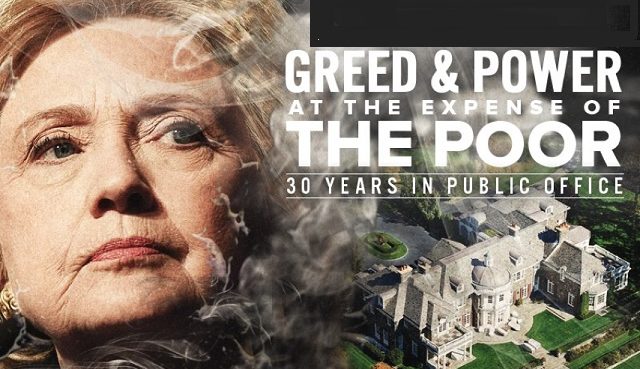
On March 3, Trump and Putin held a telephone conversation. They spoke for an hour and a half.
The discussions were described by Trump as “positive”.
Trump “unofficially” discussed “The Russian Hoax” with Vladimir Putin. “Very Productive Talk”.
“Getting along with Russia and China, getting along with all of them is a very good thing, not a bad thing, it a good thing, it’s a positive thing,” (to reporters on May 3)
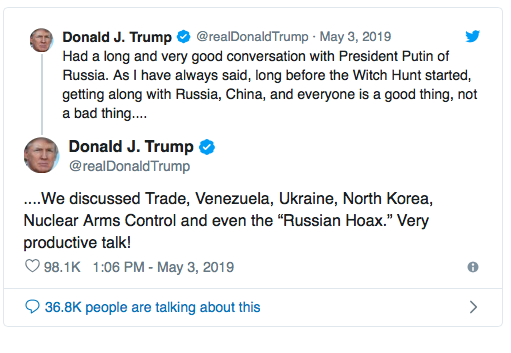
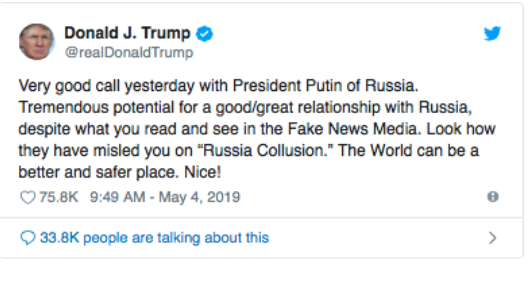
Trump confirmed that he was open to negotiations on reducing the stock of nuclear weapons with both Moscow and Beijing in the context of a trilateral deal (US-Russia-China).
Indelibly, such an agreement could potentially destabilize Trump’s 1.2 trillion dollar nuclear weapons program. It could also have an impact on the movement of Aerospace and Defense (A & D) stocks, which experienced a market bonanza in 2018.
The lifting of sanctions on North Korea, Ukraine and the crisis in Venezuela were also discussed.
The Trump-Putin telephone initiative was taken without prior consultation with John Bolton and Mike Pompeo, who have systematically blocked the restoration of normal dialogue and diplomatic exchange with Moscow.
Is this part of an unfolding internal battle between Trump and his national security advisers, not to mention Vice President Mike Pence?
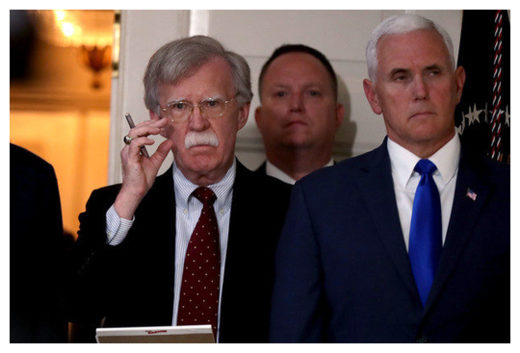
President Trump’s overture to the Kremlin visibly contradicts both Bolton and Pompeo who are threatening president Maduro, pressuring him to leave Venezuela and hand over the presidency to Guaido. According to Trump:
“He [Putin] is not looking at all to get involved in Venezuela other than he’d like to see something positive happen for Venezuela,”
It is worth noting that two days prior to the Trump-Putin telephone conversation, Pompeo told Lavrov (also in a telephone conversation) that
“the intervention by Russia and Cuba is destabilizing for Venezuela and for the U.S.-Russia bilateral relationship.”
In a bitter irony, this (telephone) statement by Pompeo was made on the same day (May 1st) as the failed “military coup” in Caracas.
Will Trump’s dialogue with Putin have a bearing on the Bolton-Pompeo threats directed against the Maduro government?
Was Trump’s call to Putin (May 3) meant to override Pompeo’s overt threats (May 1st) to intervene militarily in Venezuela?
Lavrov and Pompeo are set to meet early this week in Finland.
Will Pompeo, a former army officer, Christian evangelical and for a short while a former-CIA director change his tone and approach following Trump’s telephone conversation with Putin?
Unlikely.
Mike Pompeo has been the architect of numerous foreign policy blunders since his appointment by Trump first as CIA director in January 2017 and then as Secretary of State.
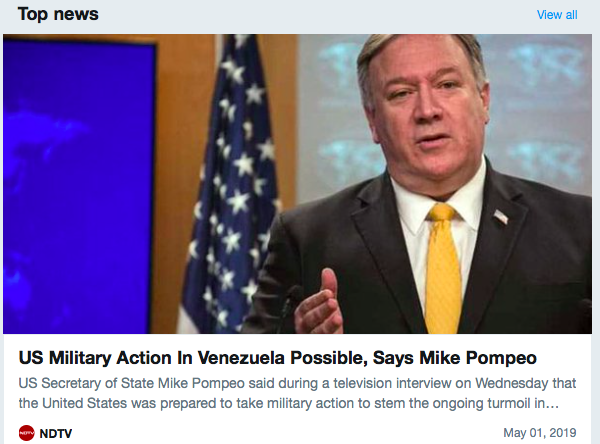
The presumption of the mainstream media (which borders on ridicule) is that Donald Trump as president of the United States should have sought the green-light from Bolton-Pompeo.
The fact of the matter is that these two individuals are deliberately involved in sabotaging US relations with a large number countries:
The conversation, which Trump went on to describe as “very positive,” appeared to be yet another example of Trump taking Putin’s claims at face value despite contrary evidence from his own government. The White House national security adviser, John Bolton, and U.S. Secretary of State Michael Pompeo both said earlier this week that the Kremlin talked Maduro out of leaving Venezuela after U.S.-backed opposition leader Juan Guaido attempted to end his regime on Tuesday by calling for a military uprising. (emphasis added)
RussiaGate 2.0
How is this internal confrontation going to evolve? Who is calling the shots at the White House?
Pompeo and Bolton are an obstacle to normalizing diplomatic relations with Russia.
They are dangerous individuals, psychopathic in their understanding of global geopolitics, influential with regard to sanctions and military intervention.
They are also misinformed with regard to the consequences of the use of nuclear weapons, which they consider as peace-making bombs.
Both Bolton and Pompeo were instrumental in the sabotage of the latest US-North Korea summit in Hanoi.
Impeachment
Despite the release of the Mueller report, the impeachment campaign prevails. Immediately following the Putin-Trump telephone conversation, the campaign to impeach Trump has gone into high gear.

The Atlantic, March 2019
Will The Kremlin Intervene in the 2020 elections?
Another absurd proposition: The US media is now intimating that Trump’s conversation with Putin is setting the stage for Kremlin intervention in the 2020 elections:
“Mr. President, did you tell him not to meddle in the next election?” a reporter asked.
“Excuse me, I’m talking, I’m answering this question. You are very rude. So we had a good conversation about several different things,” Trump told the reporter.
When asked again about Russian interference in future U.S. elections, Trump said: “We didn’t discuss that.”
According to the Democratic presidential candidate Julián Castro
“President Donald Trump wants Russia to interfere on his behalf again in 2020”.
“All of a sudden, he’s willing to take the word of a leader like Vladimir Putin who, time and again, has shown himself to be adversarial to the United States and to be dishonest,” .

In turn, former Vice President Joe Biden, who is now candidate for the 2020 presidential elections has stated:
“that Congress would have “no alternative” but to impeach President Trump if his administration seeks to block its investigations of issues raised in the special counsel’s report on Russian election interference.” (WaPo, April 30, 2019)

The original source of this article is Global Research
Copyright © Prof Michel Chossudovsky, Global Research, 2019
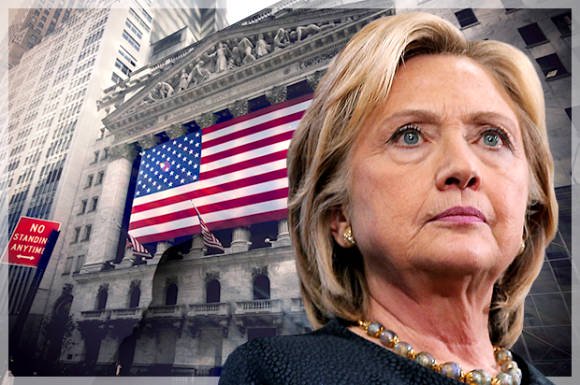
ANNEX.
The Russian embassy in the US on the Trump-Putin Telephone Exchange
Vladimir Putin had a telephone conversation with President of the United States of America Donald Trump, at the initiative of the American side.
The current state and prospects of bilateral relations were discussed with a focus on economic cooperation. The two presidents spoke in favour of developing mutually beneficial trade and investment relations. They affirmed their shared commitment to step up dialogue in various areas, including on issues of strategic stability.
Vladimir Putin informed Donald Trump of the key results of his April 25 meeting in Vladivostok with Chairman of the State Affairs Commission of the DPRK Kim Jong-un, stressing that Pyongyang’s good-faith fulfilment of its commitments should be accompanied by reciprocal steps to ease the sanctions pressure on North Korea. Both parties noted the importance of consistent progress towards denuclearisation and achieving long-term normalisation on the Korean Peninsula.
The situation in Ukraine was touched on in the context of the recent presidential election. Vladimir Putin emphasised that the new leadership in Kiev should take real steps to implement the Minsk Agreements, which are critical to resolving the internal Ukrainian conflict.
While exchanging views on the situation around Venezuela, the President of Russia underscored that only the Venezuelans themselves have the right to determine the future of their country, whereas outside interference in the country’s internal affairs and attempts to change the government in Caracas by force undermine prospects for a political settlement of the crisis.
It was agreed to maintain contacts at various levels.
